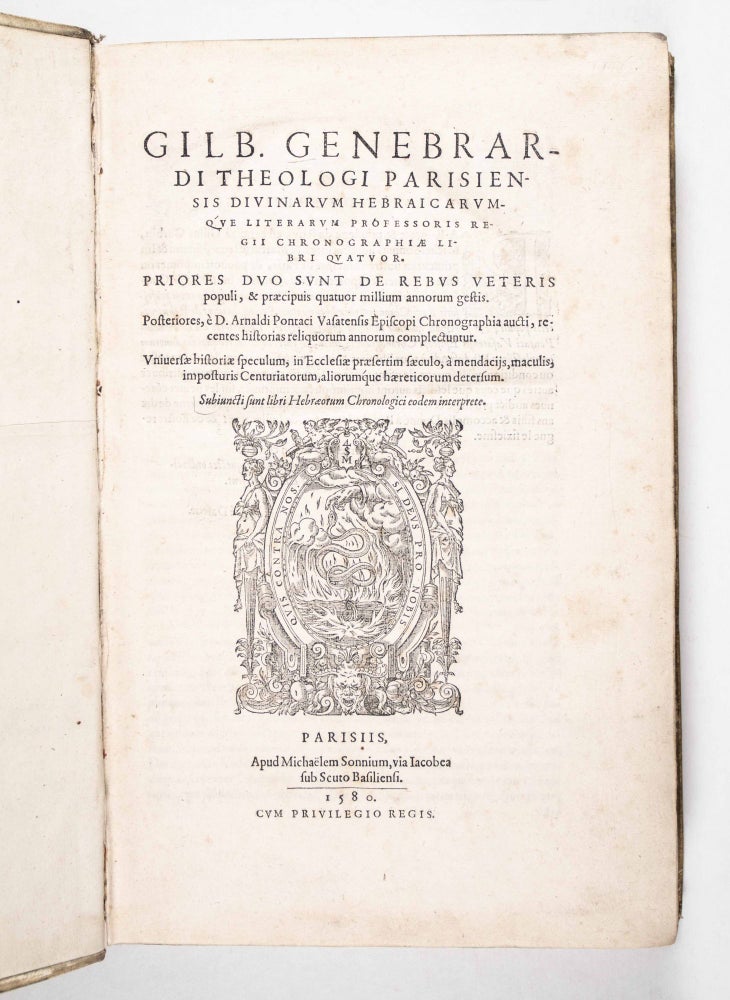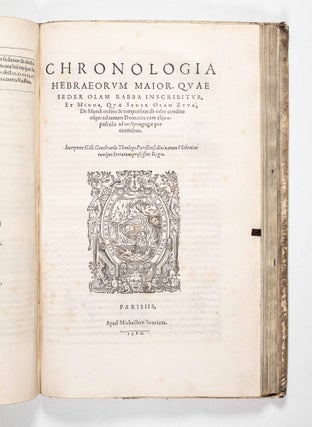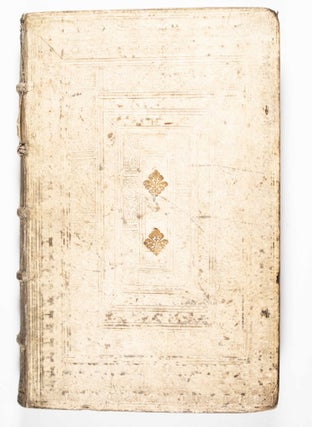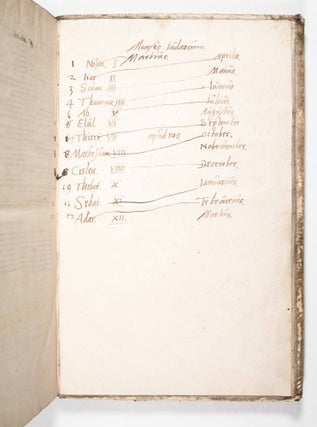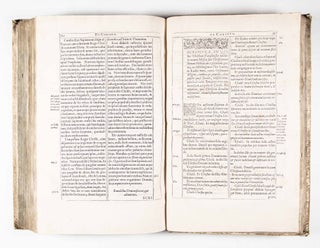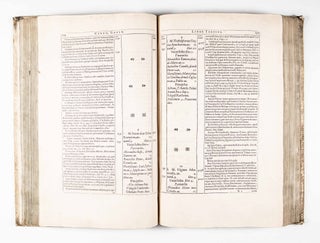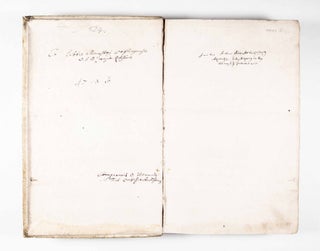Chronographiae libri quatuor... Subiuncti sunt libri Hebraeorum chronologici eodem interprete
Paris: Michael Sonnius, 1580. Hardcover. Two parts, folio: [asterisk]6 2[asterisk]4 A-2Q6, 2R2, 2S-3D6, 3E4 (= 310 leaves; blank 3E4). [20], 568, [2], [27, index], [3, blank]pp. Separate full titles for “pars altera” of the main work and the “Chronologia Hebraeorum”, the latter with printed marginalia. Contemporary roll-tooled pigskin, spine with raised bands. Wear at spine head, neat tear along upper joint of top two spine compartments. Occasional faint toning, or mild foxing. A very good, amply-margined copy, with clean, crisp text.
Collective edition. The first part, comprising the chronicles by Gilbert Génébrard and Arnaud de Pontac, originally appeared at Paris in 1567 (Schwarzfuchs 316). The second part comprises the earliest Latin versions of two Hebrew chronicles, translated by Génébrard: Seder Olam Rabba, first published at Paris in 1578; Seder Olam Zuta, first published at Paris in 1572 (Schwarzfuchs 339); the extract from De Iudaeis clausis by Eldad Hadani, translated by Génébrard, first appeared at Paris in 1563.
The Archbishop of Aix-en-Provence, Gilbert Génébrard (1537-1591) studied Hebrew under the formerly Jewish convert to Catholicism, Abraham of Lunel (Caesar Braneusius), and was later a pupil of the celebrated Hebraist, Jean Mercier, in Paris, where he became 'professeur royal' in 1569. Génébrard was an extremely versatile scholar who published many works. His proficiency in Rabbinic Hebrew was motivated in part by the desire to reduce the use of Jewish books by Christian biblical scholars, as he believed that they could be a dangerous influence. He translated the travels of Eldad ha-Dani, the poems of David Ibn Yachya, parts of Maimonides' Guide for the Perplexed and his 'Articles of Faith', and the rabbinical world history Seder Olam. "The scope of his works shows Génébrard as a very broadly oriented Hebraist whose Hebrew literacy was comparable to that of Sebastian Münster" (Hebraica Veritas Catalogue, p.58).
Attributed to the second century tanna Yose ben Halafta, Seder Olam Rabba enumerates the dates of major events from the creation of the world through the Bar Kokhba Revolt in 132-166 CE. This Hebrew chronicle "was the first to establish the era 'from the creation of the world' (ab creatione mundi, abbreviated A.M. for anno mundi). Utilizing the biblical chronology and reconstruting post-biblical history as well as he could, the author arrived at the conclusion that the world was created 3828 years before the destruction of the Second Temple by the Romans." The anonymous early medieval chronicle Seder Olam Zuta is written mostly in Hebrew with some Aramaic passages. The enumeration of the Babylonian exilarchs (leaders of the Jewish community) of the fourth and fifth centuries "is historically important as it is the only source of information for this period. The Karaites also traced back the descent of their exilarchs through this record" (EJ).
The entire work concludes with a brief compendium on pp.551-570 "De Christo Caput" which rehearses the references to Jesus of Nazareth found in Maimonides, the Aramaic Targumim and the Talmud (some of which were later expurgated, by Christian censors).
Hebrew type appears on p.251: anshei Teviryah (the men of Tiberias); p.535: a short extract from Joseph ben Gorion, Hist. Hebraicae, cap. 15. One of at least three issues; others attributed to Gilles Gourbin and Pierre L'Huillier; the colophon of of copy notes: excudebat Parisiis Martinus Iuvenis, M.D.LXXIX. Adams 397 "apud Martinum Iuvenem" with identical collation. Schwarzfuchs (Paris) 370. Cf. Heller (16th Century) p.53 (ed. Mantua, 1513) Rabba, Zuta, Sefer Kabbalah (Hebrew); p.617 (Paris, 1572) Zuta (Hebrew). Heller also disscusses Eldad ha-Dani (pp.91; 127), though it is unclear as to whether these works include the present extract.
Provenance: Three old entries appear at the front paste-down and endleaf: one by a Jesuit scholar notes that the author was Archbishop of Aix-en-Provence; the other two appear to indicate that ithe volume had been in a monastery library in the vicinity of Ratisbon until 1730, after which it was acquired by a professor of theology. Very Good. Item #48843
Price: $1,750.00

